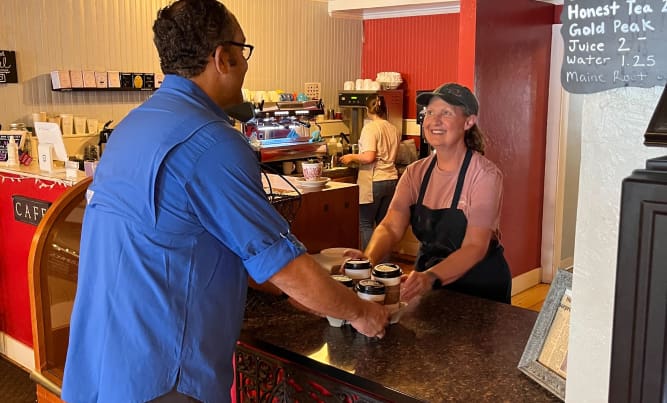In this blog post, we delve into the crucial topic of “how to stop spam calls.” This pressing issue in the area of consumer protection is especially important for our seniors. Our country has faced challenges in effectively blocking these unwanted calls. Spam calls are a nuisance for the general population. However, they pose a specific threat to seniors. These fake calls contribute to the staggering $2.9 billion annual cost of elder financial abuse, as reported by the National Council on Aging.
These unwanted calls range from fake lottery winnings and work-from-home schemes to aggressive debt-collection tactics. As the prevalence of such calls escalates, understanding and implementing ways to stop them becomes imperative. We will explore the different ways spam calls affect seniors and their families. We will also discuss potential legislative solutions and offer practical advice on how to stop spam calls.
Why Am I Getting So Many Spam Calls?

Have you ever asked yourself, “why am I getting so many spam calls?” Has a sibling ever asked “why is my granddad getting so many fraud calls?” If this is you, then it’s crucial to understand the underlying mechanisms of telephone fraud scams, a common source of these unwanted calls.
- Impersonation: Scammers often impersonate trusted organizations such as banks, government agencies, or charities. They often use caller ID spoofing technology to make the call appear as if it’s coming from a legitimate source.
- Creating a Sense of Urgency: These fraudsters are skilled at creating a sense of urgency or fear. They might claim there’s a problem with your bank account. Additionally, they might say that you owe taxes, or even that a family member is in trouble. Scammers use this tactic to make you act quickly, often without thinking.
- Request for Personal Information: The next step in their scheme is to ask for your personal information. They might request you to confirm your bank account number. Some ask you to provide your social security number or disclose your credit card details.
- Fraudulent Actions: Once they have your personal information, they can use it for fraudulent activities. This could range from stealing money from your bank account or making unauthorized purchases with your credit card. Utlimately they wasn to steal your identity.
Strategies To Protect Yourself and Your Loved Ones
So, if you’ve asked yourself “why am I getting so many spam calls?”, it’s because your number has likely ended up in the hands of these scammers. To protect yourself and your loved ones:
- Never give out personal information over the phone unless you initiated the call to a number you know and trust.
- Be wary of calls that create a sense of urgency or fear.
- Remember that legitimate organizations will never ask for sensitive information through unsolicited calls.
- If in doubt, hang up and call back the organization on a number sourced independently, such as from their official website.
- Have regular conversations and keep in touch with grandparents and elderly relatives to talk about unusual or suspicious calls.
By understanding “why am I getting so many spam calls?” you can take proactive steps to protect yourself and your loved ones from these telephone fraud scams that have become a lucrative business.
The Lucrative Market of Scam Calls

Spam and fraud calls are a massive problem. In 2022, the Federal Trade Commission (FTC) received fraud reports from 2.4 million consumers. However, according to extrapolations based on polling data collected by Truecaller, a popular caller ID and call blocking phone app, close to 68 million Americans lost money due to a phone scam in 2022.
The problem of trying to block fraudulent calls is only getting worse. The average victim loses around $500-600 per incident, but some may lose tens of thousands of dollars. These operations often take advantage of people’s ignorance of how to block spam calls or a lack of knowledge on telemarketing calls.
The Most Expensive Robocall Scam
The Federal Communications Commission (FCC) proposed a record $300 million fine against an alleged robocall scam that involved more than five billion unsolicited calls to consumers over a three-month period. People knew the scam as the “auto warranty scam.” Roy Cox, Jr. and Michael Aaron Jones, both from the United States, created it. Authorities had previously banned them both from making telemarketing sales calls.
The operation falsely marketed its service as car warranties but was actually seeking to generate leads to sell vehicle service contracts. The operation placed about 5.2 billion calls to more than 550 million wireless and residential phones between January and March 2021, using over one million unique caller ID numbers. The FCC stated that this was the largest robocall operation it has ever investigated.
Where do Spam Calls Come From?

Photo: Nick Palumbo and his wife Natasha Palumbo, are an American couple accused of facilitating hundreds of millions of fraudulent robocalls. They agreed to a settlement with the U.S. Department of Justice to never operate a telecom business again.
While spam calls are often perpetuated by foreign nationals, they receive help and support from the United States. An Arizona man named Nick Palumbo helped foreign actors disguise their phone numbers on caller ID and routed hundreds of millions of scam and telemarketing calls, most of them for Social Security imposters. While the Palumbos settled with DOJ, they were not forced to admit to any wrongdoing. Nor were they required to pay a fine or provide restitution to victims. But the settlement prohibits them from operating a VoIP business or providing toll-free services.
An ever-expanding number of similar operations are still active in the US, taking advantage of loose legislation and the relatively low cost of entry to enter the spam call business.
What is Being Done to Block Spam Calls
In the modern era of communication, the question “How to stop spam calls?” has become increasingly relevant, as individuals, corporations, and governments alike grapple with this pervasive issue.
Governmental Efforts to Curb Spam Calls

Photo: A small, sleepy village in the Jamtara district of Jharkhand, India. It has gained notoriety as a hub of international cybercrime – Shrikant Srivastava
Numerous governments have passed legislation intended to stop the never-ending barrage of spam from unidentified callers, but they have done very little to enforce it. Authorities recognize the Indian cities of Jamtara and Kolkata as the “scam capitals of the world.” Despite numerous attempts by the Indian federal government to stop scammers, local officials are slow to act and often on the payrolls of the call centers, making raids and arrests an uncommon occurrence.
In the U.S., local routing services can often claim ignorance and escape the consequences for facilitating millions of unwanted calls, claiming that their customers presented themselves as real companies and hid the truth. However, there is hope. Congress has passed several laws making blocking calls from scammers a priority, including:
- Mandating phone companies to quickly adopt call authentication technology to verify an incoming call’s legitimacy.
- Alleviating potential repercussions for wireless carriers terminating suspected scam calls.
- Increasing penalties for spam robocallers, with fines escalating from $1,500 to up to $10,000 per illegal call.
- Directing the FCC and service providers to establish a system notifying customers of “spoofed” calls, where the caller ID imitates a local area code or a well-known entity.
Corporate Initiatives to Block Unwanted Calls
Wireless carriers have long wanted to clamp down on illegitimate calls but feared the steep penalties associated with cutting off calls in progress. With new legislation, they can now take more direct measures to ensure that all received calls are legitimate and even form blacklists of suspicious routing services and individuals.
While this is a long way from perfect, these measures have already helped hundreds of thousands, if not millions of Americans avoid spam on their phones. With their resources, time, and expertise, wireless carriers have a far greater ability to block calls, trace unknown callers, and filter spam calls.
On top of this, some companies have developed third party apps that can be used on mobile phones to determine whether an incoming call is potential spam or not. Recently, researchers have been investigating AI-driven call filtering, which could potentially become the most effective method to block calls from spam callers without impacting legitimate callers.
Individual Contributions to Combat Spam Calls

Photo: Kitboga is the Internet alias of an American Twitch streamer and YouTuber. His content primarily focuses on disrupting the activities of scammers.
Stopping spam calls on one’s own seems overwhelming. However, some individuals have risen to the challenge. They waste scammers’ time and employ white hat hacking. People are using social engineering, programming, and language skills to disrupt illegal spam call centers. These efforts are helping authorities catch perpetrators.
These individuals include the streamer Kitboga who uses social engineering and voice changing software to intercept calls from spammers and waste the time of the people on the other side. He often can keep phone scammers on the line for hours. This prevents these criminals from targeting others while he talks to them.
Youtubers Scambaiter and Jim Browning hack into spam call centers, stop calls in progress, and even help local authorities organize police raids on offices of illegal call centers perpetuating scams and intrusive advertisements. While the problem seems large, individual expertise and knowledge goes a long way into avoiding or even stopping scammers outright.
Legislative Fixes to Help Block Spam Calls
Empowering users with the knowledge to avoid a scam can go a long way in stopping spam calls. However, additional legislative steps should be taken to prevent our citizens from being the targets of fraud.
In 2019, Congress passed a law allowing phone companies to block robocalls, however, legal loopholes have impacted the effectiveness. The government needs to enact stronger legislation that includes bigger fines and punishments for scammers. Additionally, we need measures to hold domestic routing services accountable for the spam calls they allow to target Americans.
Strengthening and expanding the National Do Not Call registry would keep more Americans safe by blocking unwanted calls.
Furthermore, cooperating with foreign governments is another key strategy to stopping spam calls at their source. The FCC should extend cooperation with counterparts in Canada, the EU, Romania, Brazil, and Australia. These efforts would improve the government and industry’s ability to trace and eliminate the sources of spam calls.
We have great partners in this fight to prevent our parents and grandparents from being targets on fraud. However, nations with high incidences of illegal call centers like India and Mexico have work to do. They need to improve their cooperative action against this type of fraud.
How to Prevent Suspicious Calls

Photo: Image of the Federal Trade Commission Building in Washington, DC. Home to the Do Not Call Registry – FinkAvenue
To curb spam calls, consider adopting these key tactics:
- Activate your service provider’s call-blocking or call-filtering functions: This feature, often provided by most carriers, is usually turned on by default. It helps filter and block known spam numbers.
- Enlist your number in the National Do Not Call Registry (DNC): Registration in the DNC Registry, run by the Federal Trade Commission (FTC) helps reduce telemarketing calls. Go to the FTC National Do Not Call Registry here and add your number to a list that marketers are legally obliged to avoid.
- Exercise caution when receiving calls from unfamiliar numbers, especially if unexpected: If you don’t recognize a number, it’s generally safer not to answer. Unknown numbers are frequently associated with spam or scam calls.
- Leverage a call screening service: These services can help identify and screen out potential spam calls before they reach you, adding an extra layer of protection. If you use an android phone, you can enable call screening in your phone app. If you use an iPhone there are several third-party apps available to block calls.
- Refrain from sharing personal or financial information when you answer calls from unknown callers: It’s essential to avoid divulging sensitive information over the phone, especially if the caller’s identity is unclear. This can help prevent identity theft and fraud.
Bottom-line
Spam calls present an ever-growing threat to consumers, particularly our vulnerable seniors, causing significant financial loss and emotional distress. Understanding the mechanics of these scams is our first line of defense.
But beyond individual actions, we can make substantial progress through collective efforts. Mandating carriers to adopt call authentication technology and toughening penalties for robocallers show promise. Telecom providers’ are stepping up with call-blocking initiatives. Third-party spam detection apps are proliferating. Private individuals like Kitbog a demonstrating inspiring efforts. All of these action contribute to this multifaceted fight.
But the war is far from over. We need stricter legislation, stronger enforcement, international cooperation, and continued vigilance from every citizen. In a world increasingly interconnected through technology, we must stand united against these invisible threats. Together, we can shield our loved ones and ensure a safer society for all.
First time reading? If you want rational takes on foreign policy, politics and technology then sign up below or click here for “The Brief.” It’s a twice-a-month email covering topics that deserve discussion but are currently overlooked, all in 5 minutes or less






























